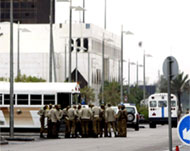Saudi protests apparently thwarted
Hundreds of Saudi security forces kept an iron grip over central Riyadh on Thursday to thwart protest marches planned by an exiled dissident against the kingdom’s absolute monarchy.

Riot police with helmets, batons and shields lined a main street in the Saudi capital while a helicopter hovered above the area where London-based opposition figure Saad al-Fagih had called for tens of thousands of people to assemble.
At 4pm (1300 GMT), three hours after Fagih had promised the demonstrators would begin their march, there was no sign of any organised protest in the Saudi capital. In the Red Sea city of Jedda, no march took place but police made three arrests.
Demonstrations are banned in Saudi Arabia.
“This is an Islamic country which does not permit protests. There is no need for it,” said a middle-aged Saudi man outside a mosque in central Riyadh.
“Everything is provided for these people. They are just outlaws with strange ideology. We do not agree with them.”
Ready for clashes
Special forces wearing balaclavas and bullet-proof vests surveyed the area. At least one had a gas mask. Vehicles with water cannon were also on standby.
 |
|
The streets of Riyadh were quiet, |
In Jedda, a Reuters correspondent saw one man being chased and arrested after he shouted slogans outside the Jafali mosque where Fagih had asked demonstrators to gather. The other 30 worshippers left the mosque peacefully after midday prayers.
Two other people were arrested nearby. There were about 20 to 30 police cars outside the mosque.
London-based Fagih, who heads the Movement of Islamic Reform in Arabia, said this week the planned demonstrations aimed to overthrow the Saudi royal family. Police last year broke up a small street protest in Riyadh organised by Fagih.
Fagih broadcasts his calls for change into Saudi Arabia from Britain by radio, satellite TV and the Internet.
On the eve of the planned marches, 35 religious scholars issued a statement condemning Fagih and warning Saudis against supporting him.
“It is our duty and responsibility to advise you, because of our concern for the stability and security of the country … to reject this act, and we warn against participating in it,” said the statement, signed by prominent religious figures including leading Sunni cleric Salman al-Awdah.